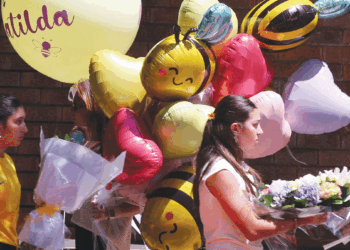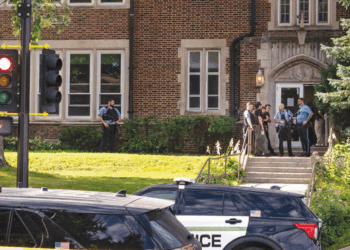The Web site of the Union for Reform Judaism informs us that “Sukkot, a Hebrew word meaning ‘booths’ or ‘huts,’ refers to the Jewish festival of giving thanks for the fall harvest, as well as the commemoration of the 40 years of Jewish wandering in the desert after Sinai. Sukkot is celebrated five days after Yom Kippur, on the 15th of Tishrei, and is marked by several distinct traditions. One tradition, which takes the commandment to ‘dwell in booths’ literally, is to build a sukka, a booth or hut. A sukka is often erected by Jews during this festival, and it is common practice for some to eat and even live in these temporary dwellings during Sukkot.”
In addition to the commandment to dwell in huts, we daven during Sukkot with the “four species,” lifting and shaking a lulav, a palm frond, branches of myrtle and willow, and an etrog, a yellow citron, an aromatic citrus fruit. This prayer has always reminded me of American Indian rituals, in respect to shaking the lulav and etrog to the earth and sky, and to the four directions.
(Please check out the JTA story on Page 3 of the print edition, about Matt Bycer, a 33-year-old attorney who grows etrogs in Scottsdale, Ariz.)
Another parallel to the lifeway of American Indians can be found at the conclusion of Sukkot, during Shemini Atzeret (the Eighth Day of Assembly), when a special prayer for rain, Tefilat Geshem, is recited. I have seen rain dances on the Tohono O’odham (formerly known as Papago) reservation, on today’s Arizona-Mexico border. In 1982, I camped out in a desert wash for a week, reporting on an international conference of Indians from North and South America. Sometime during the event — amid the broiling heat, dust devils, scorpions, tarantulas and diamondback rattlesnakes — two groups of rain dancers from the reservation performed the traditional ritual. A rain dance made sense, as there was no water near our camp — water was trucked to us in small tankers.
It’s somewhat the same story in Israel.
“For those living in the Land of Israel, [Tefilat Geshem] was a logical extension of the praise and thanks for the harvest, since rain is needed during the winter months,” writes Rabbi Wayne Dosick, in Living Judaism. “For those who came to live outside the Land of Israel, the prayer for rain established a bond to the Land and its needs that linked the Jews of the diaspora to the Jewish Land throughout the centuries of exile. Now, on Shemini Atzeret, in addition to all the special festival prayers, the Yizkor memorial prayers are also recited.”
I should add that Minnesota also needs rain. If you go to Minnehaha Falls lately, there is a weak trickle where the rushing waters usually can be seen. You can walk down the middle of the dry creek bed in some stretches of Minnehaha Creek in South Minneapolis. Pray for rain!
Sukkot is also known as z’man simchateinu, the season of our joy; and the Torah tells us: “You shall rejoice in your festival… you shall have nothing but joy” (Deut. 16:14-15).
However, at the same time as we are rejoicing, we are mindful that the sukka also symbolizes the transitory nature of our existence here. The Jewish experience over several millennia is one of wandering, dispossession and cruel repression in many lands.
The sukka is a temporary structure, which reminds us that we are fortunate to have food on our table and a roof over our head. Many — in the United States, and more in less developed countries — do not have enough food for their families. Our society is plagued by homelessness, housing that is unaffordable for many, underwater mortgages (where the amount outstanding on a loan is greater than the home value) and foreclosures leading to blight in some neighborhoods.
“Foreclosures devastate families and neighborhoods and hamper economic recovery,” the National Low Income Housing Coalition (NLIHC) points out. “Experience and research have revealed that the foreclosure crisis affects more than homeowners. As landlords have defaulted on their mortgages, renters in good standing have been evicted from properties in foreclosure with little or no notice. In fact, NLIHC research shows that renters make up as many as 40 percent of the households facing foreclosure.”
The NLIHC lobbies Congress to promote housing programs that serve low-income people. This work entails monitoring the federal budget process and advocating for the highest level of appropriations for HUD and USDA Rural Housing programs, “while assuring sufficient funding to preserve all existing low income housing resources and prevent loss of units affordable to, or rental assistance for, extremely low income households.”
The rhetoric during the current political season has been dominated by jousting over Medicare and Obamacare — housing issues, including the foreclosure crisis, have gotten short shrift. It’s something to think about in the sukka.
In this vein, the Pioneer Press published a story last week about working families struggling to keep things together during the ongoing economic downturn.
“Housing is one of the biggest challenges,” the article noted. “People who have lost their homes to foreclosure are now renting, causing apartment vacancy rates to plummet and rents to skyrocket.” The story quoted from a report issued by the Minnesota Housing Partnership: “The ranks of people on the edge of homelessness are rising as a result.”
In its discussion of the housing piece in the Great Recession, the Pioneer Press reported: “The American Community Survey data shows about 60 percent of renters in Minnesota are ‘cost-burdened,’ meaning they pay 30 percent or more of their income in housing costs. That’s up from 45 percent in 2006.”
Occupy Wall Street, a belated movement protesting the perfidious investment banks that wrecked the global economy, recently marked its first anniversary with demonstrations in New York City and other cities around the country. In the Twin Cities, a branch of the Occupy movement, Occupy Homes MN, has focused on the foreclosure crisis, and has met with some success in getting lenders to renegotiate mortgage loans with families on the verge of eviction. The group’s civil disobedience tactics have also resulted in dozens of arrests; and the city of Minneapolis has taken a harshly punitive approach to the protests, piling on the charges for participants in nonviolent actions meant to draw attention to the issue.
The former home of the Cruz family on south Cedar Avenue (a few blocks from my house), for example, was the site of a number of demonstrations, and about a dozen Occupy activists (including renowned local rapper Brother Ali) are facing criminal charges in Hennepin County court. Alerted to arrests one evening at the end of May, I went to the Cruz home as protesters were being transported downtown in police squad cars. After the police raid, two dozen Minneapolis cops stood guard for hours on the front lawn of the abandoned house. (The $50,000 that the city spent on police overtime pay would have gone a long way toward squaring up the mortgage loan.)
As we go to press with the paper this week, I am thinking about Kol Nidre, and the beginning of the Yom Kippur fast. In the liturgy we will read about the nature of the “fast” that God truly desires of us (Isaiah 58:6-7):
To unlock the fetters of wickedness,
And untie the cords of the yoke
To let the oppressed go free;
To break off every yoke.
It is to share your bread with the hungry,
And to take the wretched poor into your home;
When you see the naked, to clothe him,
And not to ignore your own kin.”
The editors and staff of the Jewish World wish our readers “Chag Sameach!”
— Mordecai Specktor / editor@ajwnews.com
(American Jewish World, 9.28.12)


















